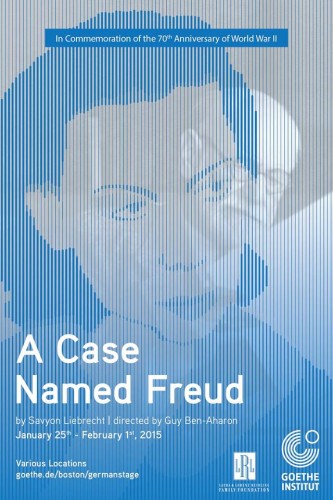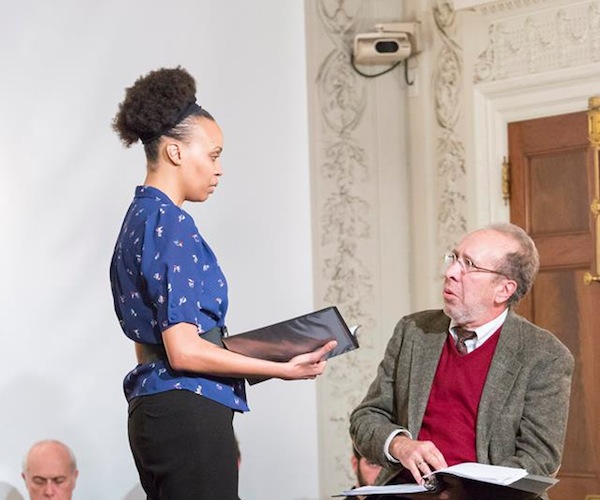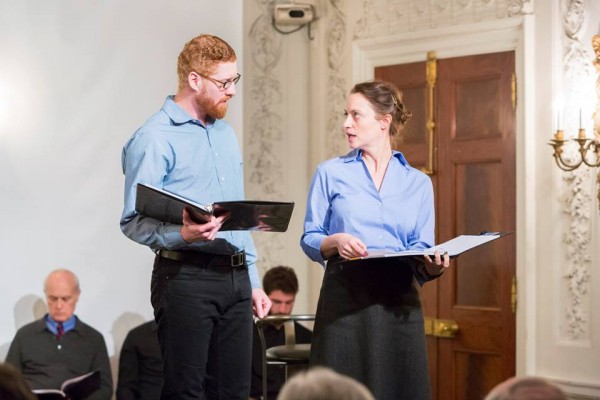Stage Review: An Israeli Playwright Expertly Analyzes “A Case Named Freud”
Israeli dramatist Savyon Liebrecht’s new play A Case Named Freud is her most ambitious and dramatically satisfying yet.
A Case Named Freud by Savyon Liebrecht, translated from the Hebrew by the author. Directed by Guy Ben-Aharon. A world premiere staged reading presented by German Stage. At Suffolk University, 73 Tremont Street, Boston, MA on February 9 at 6:30 p.m.

By Ian Thal
Savyon Liebrecht has won critical and popular acclaim as both a playwright and prose writer in Israel and abroad. But, up until now, I have not shared Israeli Stage director Guy Ben-Aharon’s enthusiasm for her plays. (This is the fifth of her scripts he has presented, the fourth he has directed in the Boston area). Thankfully, the world premiere of A Case Named Freud defied my expectations and fulfilled my hopes — it is her most ambitious and dramatically satisfying play to date.
The text is the third of a trilogy of plays about Sigmund Freud, his family, and his writings. Liebrecht’s previous two scripts, Dear Sigmund and Carl and Freud’s Women, were presented as staged readings last year during the dramatist’s two-week residency with Israeli Stage. When comparing these plays to The Banality of Love, her earlier script about Martin Heidegger and Hannah Arendt (first presented by Israeli Stage in 2011), I suggested that Liebrecht was more interested in the romantic and familial loves of great thinkers than either their ideas or their political impact. In this new play (the piece has only been workshopped in Israel), Liebrecht tells a powerful story about a key historical event that neither skimps on drama or ideas.
A number of years after fleeing Vienna, Sigmund Freud’s nephew Harry Freud (Omar Robinson) returns to Vienna. His aim is to confront the Nazi official who humiliated his uncle’s family and, after the German annexation of Austria in 1938, ordered that the Freud home be plundered of its assets – including manuscripts, art, and antiques. After tracking down the official’s address, Harry encounters the doorman, an unrepentant Nazi named Kurt (Dale Place) who has trouble repressing his urge to give the Hitler salute, even though it is illegal. He is led to the flat of Doctor Alexander Wald (Ed Hoopman). The Austrian attempts to portray himself the unlikely savior of the Freud family and its legacy, which leaves his accuser incredulous.
This encounter frames a flashback to events that transpired after March 12, 1938, when Austria was annexed by the German Reich. Wald, an unemployed Austrian Nazi, has been given a new job — to investigate and expropriate the properties of Sigmund Freud and his family. At the publishing house of the International Psychoanalytic Association (IPA) at Berggasse 7, Freud’s adult children, Anna (Miranda Craigwell) and Martin (Gabriel Kuttner), are at the mercy of a pair of party thugs, who are threatening them with murder, sexual assault, and vandalism. The arrival of Wald, a polite, civil Nazi, is reassuring until he bluntly explains that he is going to seize their property: not just the holdings of the IPA, but their personal bank accounts as well as Freud’s apartments at Berggasse 19 (now the site of the Sigmund Freud Museum).
The elderly father of psychoanalysis (Ken Baltin) had been convalescing after surgery to remove a tumor from his jaw. In the play, Freud is not yet aware of the Anschluss when he is taken to Wald. (In truth, he was sufficiently recovered from his surgery to speak on the political emergency at the March 13 meeting of the Vienna Psychoanalytic Society.) After sensing the power Wald holds over him and his family, Freud decides to use the only weapon he has as a means of escape — the psychological knowledge with which he has been treating illnesses of the mind for decades. He decides to surreptitiously psychoanalyze Wald as the Nazi interrogates him about his holdings.
Wald is not a willing analysand. He was a chemist with a once promising career and is highly dubious about psychoanalysis’ status as a science. But Freud senses Wald’s weakness and, once armed with the details of the man’s biography (acquired by Martin through his own connections) diagnoses Wald to be the archetypical Nazi: he is unwilling to deal with his own internal conflicts, subsuming his individuality in the power conferred by the Nazi uniform, by wearing the swastika, a symbol whose meaning and origins he does not understand, and by following a Führer who promises salvation through obedience.

Miranda Craigwell as Anna Freud and Ken Baltin as Sigmund Freud (foreground) and Dale Place as Kurt (background) in German Stage’s staged reading of “A Case Named Freud.” Photo: Alena Kuzub.
Wald is doubtful, but he is won over when the less sophisticated Kurt testifies to the peace of mind he has gained since Austria has become part of the Reich. Once Wald’s resistance to Freud’s interpretation crumbles, he uses his position as the komissar over the publishing house to treat Freud’s writings in a new way — not to mock them, but to glean wisdom from them.
This psychoanalytic interpretation of the totalitarian mystique has become standard among Freudian-Marxists from the radical (Wilhelm Reich) and the critical-theoritical (Herbert Marcuse) to the post-structural (Gilles Deleuze and Félix Guattari). It is not clear if Liebrecht is endorsing a variant on that well-worn hypothesis. When Wald is at home with his wife Helen (Stacy Fischer) their conversations provide an alternative explanation for how people came to support and then enforce atrocious Nazi policies: it appealed to things they already believed. The Walds are educated adult citizens of what had been, up until the Anschluss, a democratic society – they had not been indoctrinated since childhood by a totalitarian regime. They had freely chosen what ideas to accept and what ideas to reject. They felt a gleeful schadenfraude when they heard rumors of the arrest of Baron Rothchild by the Nazis. They presume that his riches result from Jewish criminality and his alleged refusal to hand himself over to the Nazis until he finished his meal is an act of arrogance rather than dignity.
Like anti-Semites today, the Walds are convinced that the Jews “control” the universities, the banks, and the medical profession. Any prominence attained by a Jew must have been through illicit means and any influence wielded by a Jew must be for malevolent ends. So when the Anschluss brought Austria within the German Reich, Wald did not see his new position as an act of theft, but as a repossession of illicit gains to be returned to German society — a process called “Aryanization.” Psychoanalysis might offer an explanation for why conformity and unquestioning loyalty to a charismatic leader may be appealing, but it does not explain why the leader had to be Adolf Hitler, why his ideology had to be Naziism, and why the man did not remain a fringe phenomenon. As political scientist Daniel Jonah Goldhagen noted in Hitler’s Willing Executioners: Ordinary Germans and the Holocaust, Germans did not have to be indoctrinated or mesmerized into anti-Semitism: they only needed a leader who gave them the permission as well as the means to act on an already existing animus. The conspiratorial thinking of the Walds is the soil in which such spiritual rot is nurtured.
Wald is based on a real historical figure: Anton Sauerwald, whom the Nazis placed in charge of expropriating the Freud family’s holdings. Wald is drawn from Sauerwald’s life — he was a chemist and had been a student of Freud’s friend and colleague Josef Herzig (1853-1924). In the end, Sauerwald helped facilitate the Freud family’s escape from Vienna, along with Freud’s manuscripts and correspondence. (The play does not mention it, but in 1939 Sauerwald arranged for Freud’s Viennese cancer specialist to visit the psychoanalyst in London.) After the War, when Sauerwald was detained and tried by an Austrian court for his actions as a party official, Anna Freud wrote a letter (quoted at the end of the play) in which she cited his invaluable assistance, which secured his release in 1947. Other details of Sauerwald’s biography, including his history of alcoholism as well as possible involvement with terrorist bombings conducted by Austrian National Socialists, find their way into the dramatist’s creation of Wald.
No one alive knows why a man like Sauerwald chose to save Freud, his family, and his writings, and put himself at risk by keeping the psychoanalyst’s Swiss bank accounts a secret. Nor does anyone alive know how Freud managed to elicit Sauerwald’s help. Perhaps Sauerwald found the mortally ill Freud to be a sympathetic figure, or was intimidated by his captive’s intellectual status. Perhaps he admired Freud’s writings. Maybe, despite his anti-Semitism, Sauerwald found Freud to be an exceptional Jew. Liebrecht can only speculate, thus the invention of Alexander Wald. It turns out to be a splendid dramatic device. Ed Hoopman’s performance subtly calibrates the increasing tension between the character’s fanaticism about the Reich’s national destiny and the doubts psychoanalysis introduces. Hoopman’s scenes with Harry intimate that Wald believes that his decision to aid Freud and preserve his manuscripts, while his fellow Nazis were burning books, were redemptive acts that, ironically, are signs of his sanity amidst madness.
Liebrecht does make one significant alteration to the historical record: the confrontation between Harry Freud and Sauerwald occurred in the latter’s Vienna apartment in June, 1945. Harry was serving as an officer in the U.S. Army (he had become a naturalized American citizen in 1943), while Sauerwald had recently been released from a prisoner of war camp (he had been an officer and technical expert for the Luftwaffe and had been captured by Allied forces in March). Thus the play’s confrontation took place two years before the 1947 letter from Anna Freud that earned Sauerwald his early release. The closing scene, in which Wald reads Anna’s letter to her cousin and his accuser, is an anachronistic fiction in the service of a coup de theatre.

Ed Hoopman as Alexander Wald and Stacy Fischer as Helen Wald in German Stage’s staged reading of “A Case Named Freud.” Photo: Alena Kuzub.
During the play the Freuds fight for their survival, but in a haphazard fashion. Sometimes they are in close coordination, sometimes members take individual initiatives that, inadvertently, undermine each other’s efforts. Sigmund makes agile use of psychoanalysis to expose his interrogator’s inner doubt, while Martin fuels Wald’s paranoid fantasies about Jewish power by exploiting the high regard with which both Freud and psychoanalysis is held amongst the cultural elites around the world. Meanwhile, Anna takes on the role of her father’s caretaker and protector. It is tempting to speculate that Liebrecht sees her trio of Freuds as personifications of the ego (Anna), superego (Sigmund), and id (Martin).
Baltin and Craigwell, reprising the roles they played as Sigmund and Anna Freud in Freud’s Women, have far more substantial material to work with here. Baltin brings flair to his portrait of the father of psychoanalysis, a man fully aware that age and cancer are ravaging his body even though his mind remains as powerful as ever. Craigwell’s Anna is not only the loyal and dutiful daughter of a genius; she is also possessed of a keen intelligence that assists her in standing up to Wald’s demeaning bullying (As in her other plays, Liebrecht still largely defines her female characters through their relationships with powerful men. At the time the play is set, the real Anna Freud was director of the Vienna Psychoanalytic Training Institute and primary mover behind Freud’s flight to London.) Kuttner supplies a cagey performance as Martin, silently reading (and acting) between the lines as he appraises Wald’s weaknesses.
The presentation of A Case Named Freud was presented in commemoration of the 70th anniversary of the end of World War II and International Holocaust Remembrance Day. Given the Austrian setting, Liebrecht’s birth in post-war Germany, and her place in Israeli dramatic literature, the event was co-sponsored by the Austrian Cultural Forum New York and Israeli Stage.
The January 25th presentation also marked the final public event of Detlef Gericke-Schönhagen’s term as Director of the Goethe-Institut Boston. In 2012 he created German Stage and recruited director Guy Ben-Aharon as an artist-in-residence. Gericke-Schönhagen will be moving to Lithuania to serve as Director of the Goethe-Institut Vilnius. He has previously served as the Director of Goethe-Institut Gothenburg, Sweden and of the Program Department of the Goethe-Institut Jakarta, Indonesia, as well as Director of Film Programs at the Goethe-Institut’s headquarters in Munich. During the post-show reception, he said that his first programing initiative when he takes up his new post will involve theater.
Ian Thal is a playwright, performer and theater educator specializing in mime, commedia dell’arte, and puppetry, and has been known to act on Boston area stages from time to time, sometimes with Teatro delle Maschere. Two of his short plays appeared in theater festivals this past summer. He has performed his one-man show, Arlecchino Am Ravenous, in numerous venues in Massachusetts and Rhode Island. One of his as-of-yet unproduced full-length plays was picketed by a Hamas supporter during a staged reading. He is looking for a home for his latest play, The Conversos of Venice, which is a thematic deconstruction of Shakespeare’s The Merchant of Venice. Formerly the community editor at The Jewish Advocate, he blogs irregularly at the unimaginatively entitled From The Journals of Ian Thal, and writes the “Nothing But Trouble” column for The Clyde Fitch Report.
Tagged: A Case Named Freud, Detlef Gericke-Schönhagen, German Stage, Guy Ben-Aharon

